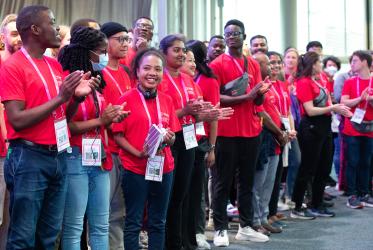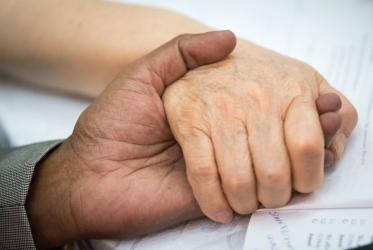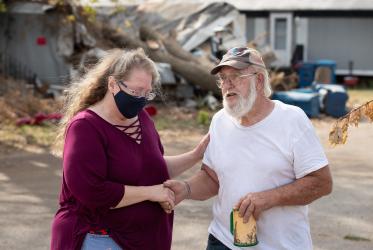Your Excellencies and Eminences, distinguished members of the diplomatic corps and guests, ladies and gentlemen present in Berlin or following elsewhere online,
1. Introduction
It is my privilege to address you and to participate with you in reflecting on the role of religion in addressing the coronavirus pandemic and global health and, for my part, to broach this topic through the recent experience of the World Council of Churches.
As you perhaps already know, the World Council of Churches is a global fellowship of 349 different Christian church bodies, together representing more than half a billion Christians in 120 countries. Inaugurated in 1948 and based in Geneva, Switzerland, the WCC is the premier ecumenical organization in the world. It has as its defining purpose to bring Christians everywhere together to overcome historic differences (unity), to offer public witness and advocacy (witness), and to collaborate in the pursuit of justice and peace (service).
Christian unity, however, is deeply linked to the search for the unity of humanity and the whole of creation. Thus, the concern for the safeguarding of creation as our common home, together and in cooperation with people of other faiths and with all those who share the same values, has been central to the programmatic work of the WCC.
As a voice for the global churches, and for those who otherwise would have no voice, the World Council of Churches has, from the start, participated actively and consequentially in the international arena. It was influential in the formulation of the Universal Declaration of Human Rights, and 75 years ago it created an instrument (the Commission of the Churches on International Affairs) for engagement with concrete issues in particular nations and internationally. Over the decades, it has brought the prophetic voice of national and regional networks of churches to influence policy and rally popular support against Apartheid, for example, and for dozens of peacekeeping and peacemaking missions, as well as for the Arms Trade Treaty, robust climate commitments, rights of religious minorities, and the treaty banning nuclear arms. From its base in Geneva and its office at the UN in New York City, the WCC has forged strong and productive collaborative programmatic initiatives with key agencies of the UN, most prominentlythe WHO and UNAIDS, UNICEF, the UNHCR, and the ILO.
Another unique component of the WCC is its Ecumenical Institute at Bossey. It is the WCC’s international centre for encounter, dialogue, and formation. Founded in 1946 and located in the Château du Bossey by the shore of Lake Geneva, the Ecumenical Institute brings together people from diverse religious communities, cultures, and backgrounds for ecumenical and interreligious learning, academic study, and personal exchange.
As you will shortly hear in detail from Bishop Bosse-Huber, the World Council of Churches will hold its 11th Assembly from 31 August to 8 September 2022 in Karlsruhe, Germany, under the theme "Christ's love moves the world to reconciliation and unity." The assembly is the highest decision making body of the WCC and normally meets every eight years. The pandemic forced us to delay the gathering until next year.
In fact, of course, it is the pandemic that brings us together today, even as the virus and its variants run rampant, and the enormous task of vaccinating, protecting and aiding the world’s population continues to tax our health and economic systems. But, I urge you, let it never tax our courage and fortitude! This is the moment for all of us—in government, in the UN, NGOs, civil society and faith-based organizations such as the WCC—to step up and give our all to defeating the virus and ensuring the safety and health of people everywhere. We pledge ourselves in solidarity to this campaign for life for all!
2. What we have done and are doing
To approach the specific theme of this session, let me pose some questions, partly in self-reflection and partly in view of our shared labours with all of you, our partners in tackling the pandemic. I want to ask:
- How has the WCC, as global fellowship, responded to the pandemic?
- Given our experience at the WCC, what role can we (and other faith-based groups and organizations) play—with each other, across religious lines, and with governments and civil society—in addressing the pandemic and its many consequences?
- What prospects and promising insights have emerged that can foster deeper engagement and more effective multilateral action by the WCC and faith-based groups and their partners around the world?
In the 20 months since the pandemic started, the World Council of Churches has, while working remotely, reoriented its work to equip the world’s churches to address the healthcare and pastoral challenges posed by the pandemic and to minister in the presence of illness, death, and enormous disruption everywhere.
Since churches and the WCC are historically heavily identified with health and healing, a Ministry Support Team was rapidly assembled to field the many pastoral questions and concerns that have arisen in local and regional settings. The team of nine resource people, with expertise in different programmatic areas, has been available to consult on how churches can discern their roles during the coronavirus pandemic, how they can adapt as faith communities, and how they can connect and share with each other. This service quickly became a ready and much-used resource for churches, pastors, and individuals around the world.
Given that staff travel and conferences were suddenly out of the question, much of the effectiveness of the WCC in this period stemmed from its rapid development of communications vehicles that could share stories from the wider fellowship, report on COVID-related initiatives, and highlight good practices among churches responding to COVID-19.They have brought to light concrete examples of how faith communities are and can be adapting. News and stories have been undergirded by a robust set of COVID resources for churches and individuals. Visits to the WCC website increased by more than 50 percent in 2020 compared to 2019, totaling more than 1.3 million visits by more than a million visitors in 2020, now further increased by our new website.
At the same time, digital innovations have also enabled the WCC’s many programmes to work together virtually with their key constituencies, often on COVID-related issues. The result has been a plethora of webcasts, podcasts, blogposts, and webinars exploring not just the immediate healthcare and ministerial challenge of the pandemic but also its implications for rethinking related issues of social justice, human rights, racial and gender equality, violence against women and children, and good governance.
Further, a number of important publications have been produced, focusing particularly on equipping the fellowship to respond to the challenges brought by the COVID-19 pandemic. An Ecumenical Global Health COVID-19 Response Framework laid out parameters of care. A joint statement on Serving a Wounded World in Interreligious Solidarity: A Christian Call to Reflection and Action during COVID-19 and Beyond was issued with the Pontifical Council for Interreligious Dialogue. And Healing the World: Eight Bible Studies for the Pandemic Era invited Christians to wrestle with their fear, grief, and uncertainty from within a biblical perspective. A special virtual issue of the WCC journals further focused on the pastoral and theological challenges posed by the pandemic.
Enhanced use of social media in this period has amplified the message of the WCC but, as important, really engaged people, especially in campaigns of solidarity and spirituality. The WCC’s identity as a fellowship united in prayer and service has been made more visible through the publication of daily morning prayers and weekly prayer texts contributed by members of the fellowship, both widely shared in social media and beyond.
In short, despite the formidable challenges that the pandemic has posed to the WCC, its effectiveness as a convenor of the worldwide fellowship of churches, as a catalyst for public witness, and as a community working in solidarity for justice and peace has, in many respects, actually been enhanced during these straitened circumstances.
Last spring, the WCC appointed nine church leaders to join the 300 other “Vaccine Champions” mobilized by UNICEF, to raise awareness of the benefits of vaccination, to counter misinformation, and to nurture trust in the vaccination programmes. As I said at the time, as COVID-19 vaccination programmes are being rolled out, religious leaders of all faiths play a critical role in sustaining public trust in health authorities and services, as well as in the approved vaccines themselves. As a Christian fellowship, it is our duty and moral obligation to publicly challenge rumors and myths and confront them with facts. While moral and ethical concerns also loom over vaccine access and distribution practices, we must take up responsibility and advocate for what is right from a medical, ethical, and human rights perspective.
Indeed, even earlier, the WCC joined with the World Jewish Congress in a joint statement inviting religious leaders of all traditions and locations to reflect on and engage the myriad of ethical issues related to global vaccine distribution.
3. Our most urgent tasks
As you can see, this time has been one of learning anew about the role of the WCC and the global fellowship in the unfolding drama of our planet and its people. For me, at least, our work and relationships over this last period and presently have hammered home some abiding convictions of the ecumenical movement:
- The heart of our fellowship—as churches and beyond—is the ecumenical spirituality we share: This is the flame that fuels our drive for justice and sparks our work for peace.
- That spiritually inspired work of the WCC has a much broader reach, however. It aims to achieve the unity of Christians and of all creation and to overcome divisions so as to serve all humanity in its quest for justice and peace.
- A measure of our accountability—as individuals and as churches—lies in our openness to being transformed ourselves and to transforming our world by meeting the concrete needs of others.
- Since global health and well-being are closely linked to our very identity as a faith-based fellowship, it is our responsibility and call to contribute multilaterally to alleviate this pandemic.
- In concrete terms, our effectiveness as a global fellowship is conditioned by our indispensable partnerships with like-minded organizations, such as governmental agencies, the WHO, UNAIDS, and UNICEF, as well as with other religious traditions, and with the constellation of international agencies and organizations that serve the common good.
On this basis and at this juncture in the pandemic, the WCC, through its executive committee, has strongly condemned the global injustice and inequities emergent in the pandemic. It has urged sharing and administering vaccines, sharing technology, overcoming skepticism, and rescuing those whose lives and health have been upended by the pandemic. It has called on governments, agencies, religious leaders, boards and leaders of corporations with ownership of patents and materials to exercise leadership and act together urgently to ensure broad, rapid, equitable, and affordable distribution of therapeutics and vaccines worldwide, to overcome this failure and to right this wrong.
Such efforts dovetail well with the international efforts of governments and the WHO. The executive committee appealed for the compassionate sharing of technology and know-how, to enable manufacturers in hard-hit countries in the Global South to produce vaccines for their people and others. “We urge greater support for and contributions to the WHO COVID-19 Technology Access Pool (C-TAP) as a key instrument for this purpose, and to the COVAX facility for more equitable distribution of available vaccine supplies,” their statement said. “We recognize that, beyond issues of supply and distribution of vaccines, other factors have intensified the impacts of the pandemic and as yet stand in the way of an exit from this crisis.”
4. Abiding commitments and further cooperation
What then have we learned from this journey? Fundamentally, I think, we have learned the real importance of our work, not in spite of our faith identity but because of it. Our identity as a global Christian fellowship enables us to address this crisis in its deeper cultural and spiritual dimensions, to break barriers and build bridges, and to work relationally. In particular:
- The pandemic has revealed or reinforced our shared vulnerability but also our fundamental community as humans, our solidarity across divides and borders, and our capacity for empathy, understanding, and even heroic sacrifice.
- The profound power and strong potential of communities of faith is the crucial variable and indispensable partner in global health and well-being. Religious life, thought, and practice by communities of faith form humanity’s backstory, so to speak, and humanity’s deepest values and convictions—including for justice and peace, for human dignity and human rights—stem from and still reside in its religious heritage.
- Faith-based organizations—whether Christian, Muslim, Jewish, or other—are uniquely positioned for practical local engagement with issues of healthcare and other local issues, while the healthcare assets of religious groups make them credible advocates with governments and others for “vaccine justice” and enhanced healthcare infrastructure.
- In fact, local and regional communities of faith are everywhere deeply engaged with the lives and health and well-being of actual persons on the ground. With Ebola in Africa, for example, churches provided crucial knowledge of local customs that, when augmented by intensive educational campaigns, contributed to successful eradication of the disease. With HIV and AIDS, to cite another example, the WCC has worked with local churches and international agencies to address the initial stigma of the disease and then moved on to address the larger unhelpful or destructive notions of masculinity, sexuality, and even of faith itself that have hampered recovery.
- The WCC’s founding mission and enduring purpose remain the ecumenical movement, that is, the global movement of Christian churches to address divisions and to search for unity.. Yet this purpose and movement were never simply or solely for the benefit of Christians or the churches themselves. From the start, the WCC’s quest for unity has been for the sake of humanity and the earth, in the interests of justice and peace.
- It is this larger purpose that drove the WCC, even before its actual founding in 1948, to work tirelessly to relocate refugees after World War II, and then to help formulate the fundamental rights proclaimed in the Universal Declaration, to respond vigorously to the heresy of Apartheid in South Africa and to violations of human rights in Latin America, and early on to stress the importance of protecting the integrity of creation in the face of a ravenous economic system.
- Health and healing are a primary locus of our contemporary engagement and are literally vital to the contemporary mission of the WCC. Nor is this accidental. One of the few things we know about Jesus is that he was a healer, and the word salvation literally means healing. In fact, we are told in the gospels (John 10:10) that Jesus came so that we might have life, and have life more abundantly. So our hearts are ready, and we will always be there.
- Increasingly we find that our programmatic labours are at the intersection of UN agencies, NGOs, and religious organizations, not just to leverage to scale but to build on consensus about the shape of the human good in our times.
- Increasingly, too, we find that our shared faith commitment—however differently conceived—and shared values draw us to closer ties and collaboration with other religious traditions in cooperative work for climate justice, for religious freedom, and against human trafficking, for example.
- Likewise, our programmatic directions, rooted in our faith and spirituality, are very much in alignment with the Sustainable Development Goals of the United Nations. The SDGs, while interrupted by the pandemic, remain key to humanity’s viability on this planet.
- Finally, although communities of faith and religious traditions, including Christianity, have much to regret and repent in their history, and are sometimes received skeptically, they remain the wellspring of our deepest cultural values and most conspicuously of the value and dignity of human life and well-being. We bring that value to bear in all we do and all we ask of others.
5. Conclusion
Has the pandemic revealed any promising new elements for our work together? I believe it has, not only in our work but also in the wider world.
The fundamental learning from this pandemic has been of our shared vulnerability—and shared fate—as one humanity. We now feel more keenly the fragility of human life—indeed, of all life on this planet. Consequently, now we all more consciously value the deep connections we share with each other in family and community, nation and world. We now evince a new openness to admitting and confronting historic injustices, and a new moral reckoning on race, class, and gender. We also more readily acknowledge and celebrate the concerns and insights of women, youth, Native peoples, and those who are routinely victimized by our economic systems and systems of healthcare, immigration, asylum, and policing.
In such ways, perhaps the pandemic will seed a new readiness for real social change and commitment to our one humanity in this one world. Let us build on that!
For that, I believe, we need a calm, reassuring faith in humanity, a realistic hope for the future, and a steadfast love that is active and all-inclusive. In partnership with all of you and with all people of good will, we in the fellowship of churches from all over the world hope to contribute to that vital endeavour.





